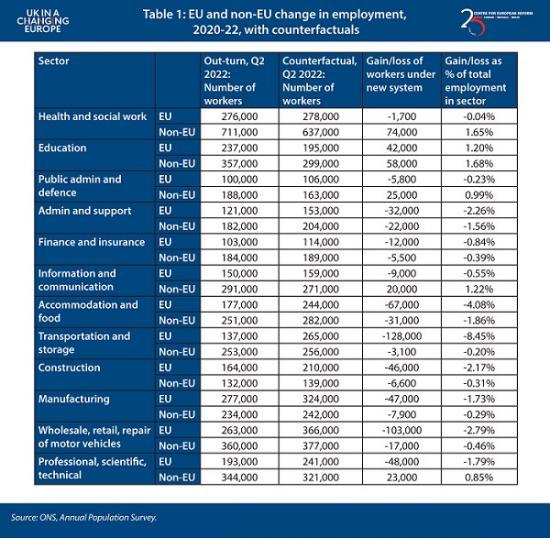Early Impacts Of The Post-brexit Immigration System On The Uk Labour Market
22nd January 2023

The end of the free movement has led to a shortfall of around 330,000 workers in Britain. Most are in less-skilled sectors of the economy.
The free movement of EU citizens was at the centre of the Brexit campaign, and concern about high net immigration from Europe in the years before the Brexit vote was one of the main reasons why Leave won the referendum.
Yet the government has enacted a relatively liberal immigration system to replace free movement. Immigration was becoming more popular even before 2016, with a growing plurality of British people agreeing since then that immigration has had a positive impact on the country.
And in the aftermath of the pandemic, big labour shortages in health and social care, transport and hospitality have led some Leave-supporting business figures like Lord Wolfson of Next, a clothing retailer, and Tim Martin of Wetherspoons pubs to call for further liberalisation.
Now that pandemic restrictions have been over for a year, and the new immigration system has been in force for two, it is possible to make some early estimates of the impact of the new immigration regime on the British labour market. This assessment is important given the labour shortages that the UK is facing. Britain is the only member of the G7 whose employment rate in the third quarter of 2022 was lower than its pre-pandemic level.
There are more than 500,000 more people who are economically inactive than before the pandemic, because they have either retired early or are unable to work because of illness or disability.
Meanwhile, many foreign nationals left the UK during the pandemic, and fewer arrived, fuelling the argument that the end of free movement contributed to labour shortages and inflation. But the Office for National Statistics estimates that in the year to June 2022 net immigration was 504,000, prompting Rishi Sunak to commit to bringing the number down.
To cut through this confusion, we estimate how many EU and non-EU workers would have been in employment if free movement had not ended and Britain's immigration laws had remained as they were before the new system started in January 2021. We then compare that counterfactual to the out-turns, as measured by the Annual Population Survey.
By June 2022, there was a significant shortfall of around 460,000 EU-origin workers, partly but not wholly compensated for by an increase of about 130,000 non-EU workers. The net loss of workers - around 330,000 - is 1 per cent of the labour force.
Note
This article is from the Centre for European Reform. Jonathan Portes is professor of Economics, King's College London and a senior fellow at UK in a Changing Europe and John Springford is deputy director of the Centre for European Reform.
Read the full article HERE
